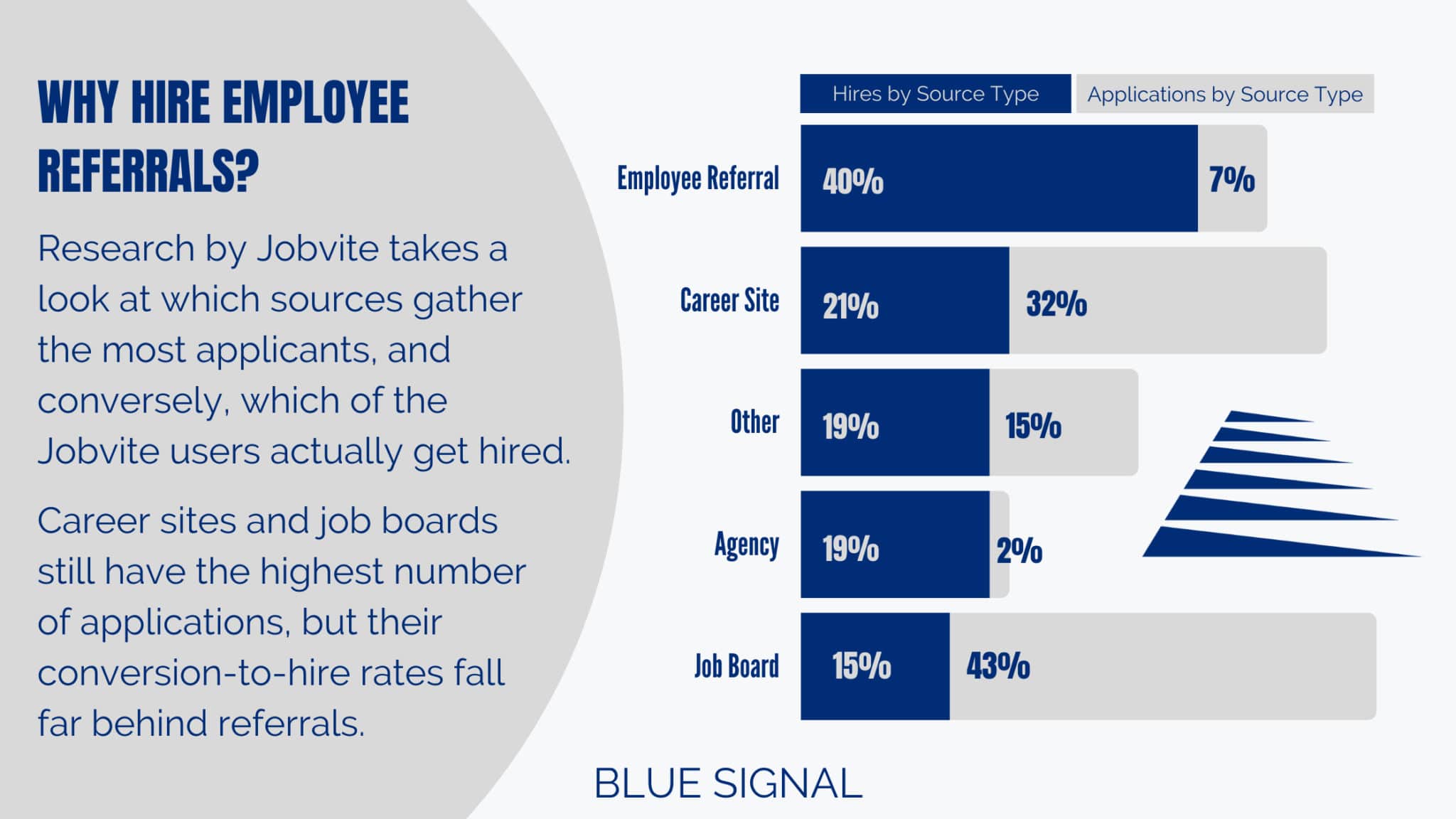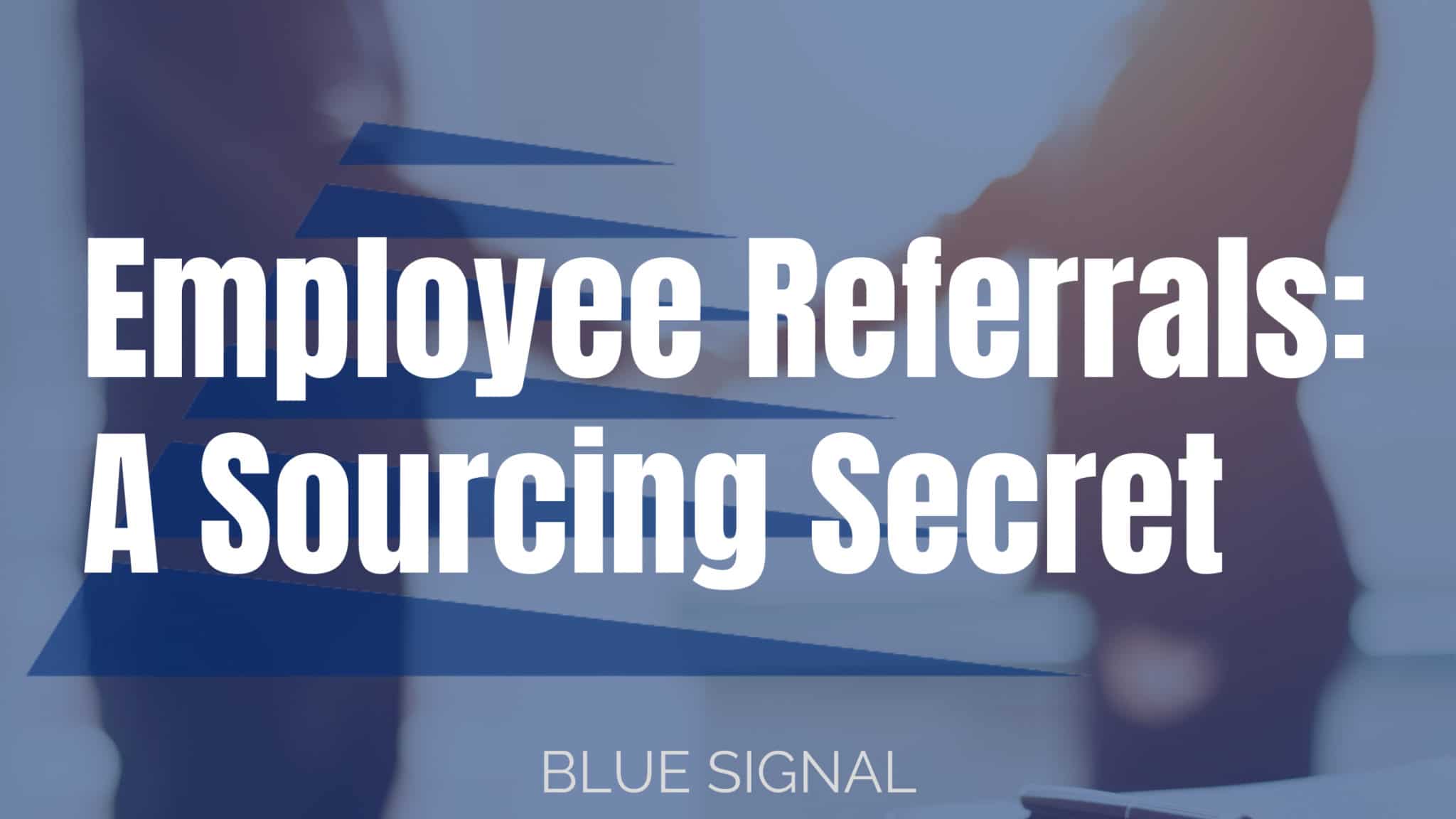The Importance of Employee Referrals
Employee referrals may be the best kept secret when it comes to recruiting. Whether you have just begun a search or are months in the trenches, employee referrals can be an important tool when sourcing talent. Traditional methods of recruiting through career sites and job boards are starting to become less fruitful as the platforms become saturated with candidates that have dozens of recruiters pining after them. When you hit a dead end with your traditional sourcing methods, it’s time to turn to your network. Recruiters and hiring managers are realizing that qualified (and often passive) talent can be found through word of mouth – that is, through asking their network for employee referrals.
Why Employee Referrals are the Best Source of Hire
They’re Effective:
Research from Jobvite found that the most effective way to find top talent is through employee referrals, citing that 78% of recruiters find their best quality candidates using this sourcing method. Despite career sites and job boards having the highest number of applications, employee referrals have the highest conversion-to-hire rate. This makes employee referrals cost effective while streamlining the timeline of the search. According to Jobvite, only 7% of applicants come from referrals. Incredibly, this small number accounts for nearly all hires – further proving that employee referrals are lucrative when recruiting top talent.

In addition to being cost and time effective, employee referrals are the most efficient when it comes to onboarding. Employee referrals onboard with an average of 29 days from their application date, which is 55% faster than applicants on a career site (with an average of 55 days). By onboarding faster than other hire sources, employee referrals are able to get up to speed and start succeeding in their new roles quicker. Consequently, this saves companies money. With the average cost of an open role being around $18,000, having an vacancy for months on end can be detrimental. At the end of the day, employee referrals are the most effective way to save time and money during your search.
They’re a Better Culture Fit:
When it comes to hiring, determining if a candidate is a culture fit can be a make-or-break decision. Despite job boards and career sites attracting hundreds of applicants, candidates referred by a current employee are more likely to reflect and/or adapt to the core values and attitudes of an organization than those from other hire sources. Consequently, recruiters consider an employee referral to be the second most important factor when evaluating a candidate because those candidates are proactively evaluated as a good fit for the company by the referring party. In addition, the new hire has a cultural support system before they even step through the door; the referring party will be genuinely invested in the new hire’s success and will help them navigate the corporate culture. As a result, having an employee that you know matches the organization’s ethos and structure will not only strengthen company culture overall, but decrease turnover.
They Have Higher Retention Rates:
Employee referrals have the highest retention rate compared to hires from other sources, with the average length of employment being over three years. Having been referred by a previous or current employee, candidates that come in with detailed insights of the company – such as company culture and structure – have a significant advantage over their counterparts. This knowledge eases new job nerves and guarantees less speedbumps during the onboarding process. Equally as beneficial, employees who refer others also have a higher retention rate, and stay at the company 20% longer. With increasing retention rate becoming a major recruiting priority for 2021, hiring managers need to invest in employee referrals – they’re a win-win-win for the referrer, referee, and the company.
How to Get Employee Referrals
Employee referral programs are a tried-and-true method of unlocking top talent. According to Jobvite, 79% of organizations offer an employee referral program, and 48% of organizations are seeing a higher participation in these programs in 2021. By tapping into their current employees’ networks, companies could potentially expand their talent pool by 10x. Although employee referral programs have potential for great success, they are entirely dependent on the motivations of the referring party – whether it’s wanting to help their friend, wanting to support the company, or wanting to receive the monetary incentive provided. Therefore, this could be unpredictable and unreliable for filling urgent roles. Whilst established referral programs can be a great source for roles that aren’t time sensitive, it is also important to consider other ways to reach employees’ networks.
Today, one of the most important networks is the one found online. Utilizing social networks among recruiters has been a common practice, but has picked up momentum in the recent years. Over one third of recruiters are leveraging social media to supplement employee referral programs. Additionally, 80% of recruiters believe that investing in social media is absolutely crucial, as more and more candidates are being found through social networks. As your network expands, so does the opportunity for employee referrals. An action as simple as a LinkedIn connection could lead to your next placement. For example, if you have 500 connections on LinkedIn and each of your connections has 100 connections, that totals 50,000 reachable contacts. When it comes down to it, it really is all about who you know.
Conclusion
Employee referrals are an unparalleled source when it comes to recruiting top quality candidates for your organization. The quality of employee referrals is reflected in their time and cost efficacy, higher conversion and retention rates, and likelihood to be a better culture fit. When searching for employee referrals, turn to your network – utilizing your company’s employee referral program or sourcing from your social network can yield an unmatched talent pool. In the midst of fighting the War for Talent, trust in Blue Signal as your partner in the process and for industry-focused tips.

